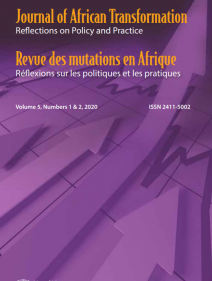The present article examines the early impact of the coronavirus disease (COVID-19) pandemic on Africa along economic and social dimensions. Aside from the health impact, the pandemic has led to an unprecedented disruption in economic activity, including demand, supply and financial shocks worldwide. The disruptions to global supply chains in a closely connected world, as well as reduced demand, have resulted in a slowdown in production. To counteract the fall in private sector demand, stabilize the financial system and ensure economic recovery, Governments and central banks across the world have deployed a range of policies and programmes. To provide a broad context, prevailing vulnerabilities and strengths that are influencing the responses of African countries to the pandemic, such as low growth and constrained fiscal space and poor social infrastructure and services, as well as the continent’s previous experience in handling pandemics and epidemics and the increasing role of non-State actors, are analysed. In addition, mitigation strategies put in place to curb the virus and the policy responses deployed to alleviate the economic impact are examined in detail.
Share this:
Reflections on Policy and Practice - Volume 5, Number 1& 2
Release Date:
17 April, 2022
© United Nations Economic Commission for Africa

